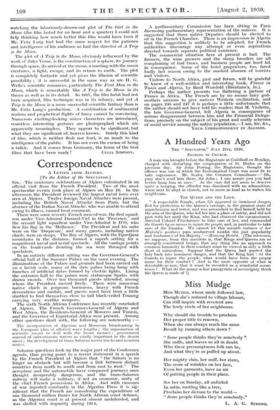A Hundred Years Ago
A man was brought before the Magistrate at Guildhall on Monday, charged with disturbing the congregation of St. Brides on the previous day. Sir John Perring, the Magistrate, thought the offence was one of which the Ecclesiastical Court was most fit to take cognizance. Mr. Scales, the Common Councilman—" Oh, pray don't send him there, Sir John ; I can assure you you had better hang him at once." As the case did not seem to deserve quite a hanging, the offender was dismissed with an admonition, when next he slept in church, not to snore so loud as to waken his neighbours.
THE QUEEN AND THE LADY.
" A respectable female, whose life appeared in imminent danger, fled for protection to the Queen's carriage, in the greatest state of apprehension and terror, and was astonished to find herself held by the arm of the Queen, who led her into a place of safety, and did not part with her until the King, who had observed the circumstance, directed Colonel Fitzelarence to take cam of her, and commanded the Guards by no means to injure the people, and, in particular to take care of the females. We cannot let this amiable instance of her Majesty's goodness pass unobserved amidst the just popularity and bonhommie of his Majesty."—Morning Herald. [The inference, wo suppose, from this anecdote is, that Kings and Queens are so strangely.constituted beings, that any thing like an approach to common humanity in their conduct must be viewed as only a little short of miraculous. Suppose that the Queen had pushed the lady back into imminent danger, and that the King had 1 Ad the Guards to injure the people, what would have been the proper name for their conduct ? And is the more opposite of what is detestable so rare, that it must be recorded as a wonderful occur- rence ? What do the penny-a-line panegyrists of sovereignty think the Queen is made of ?]
































 Previous page
Previous page